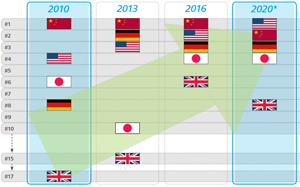
Deloitte Touche Tohmatsu Ltd. and the Council on Competitiveness have released their 2016 Global Manufacturing Competitiveness Index. In it, CEO survey respondents were asked to rank nations in terms of current and future manufacturing competitiveness. Top performing nations have each demonstrated strengths across multiple drivers of manufacturing excellence. They also clearly illustrate the close tie that exists between manufacturing competitiveness and innovation. The 2016 study takes a closer look at six focus nations: United States, China, Japan, Germany, South Korea, and India. Collectively, these countries account for 60 percent of world’s manufacturing GDP, demonstrating the influence these nations have on global manufacturing trends.
Manufacturing related activities among global nations are rapidly evolving. Manufacturing earnings and exports are stimulating economic prosperity causing nations to increase their focus on developing advanced manufacturing capabilities by investing in high-tech infrastructure and education. Nations and companies are striving to advance to the next technology frontier and raise their economic well-being. And as the digital and physical worlds of manufacturing converge, advanced technologies have become even more essential to company- and country-level-competitiveness. In fact, technology-intensive sectors dominate the global manufacturing landscape in most advanced economies and appear to offer a strong path to achieve or sustain manufacturing competitiveness.
According to the GMCI, the United States is expected to take over the number one position from China by the end of the decade while Germany holds firm at number three: The US continues to improve its ranking from 4th in 2010 to 3rd in 2013 to 2nd in this year’s study. Moreover, executives expect the US to assume the top position before the end of the decade while Germany holds strong and steady at the number three position now through the end of the decade.
—Deloitte Touche Tohmatsu Limited







